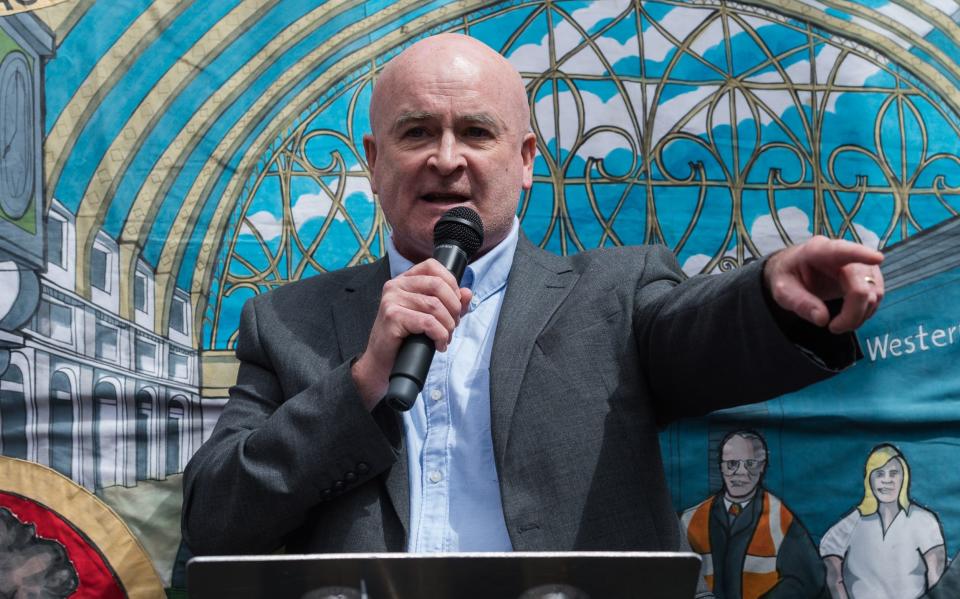Minister rolls out the charm offensive to avoid a winter of rail strikes

After his 30-minute meeting with Anne-Marie Trevelyan, Mick Whelan, the general secretary of train drivers union Aslef, reflected on his hastily arranged chat with the new Transport Secretary.
“You know, I’ve had more meetings with the new Transport Secretary in her first six days in office than I had with the last one over three and a bit years,” Whelan is believed to have muttered to colleagues as they sidled out of Great Minster House and on to Westminster’s Horseferry Road shortly after 4.30pm.
Next on the list for Trevelyan’s meet and greet at the Department for Transport headquarters was Mick Lynch, the general secretary of the Rail, Maritime and Transport workers union (RMT), who quickly became the cult figurehead of a “summer of discontent” on the railways.
Those in Whitehall were unsurprised when Lynch announced another day of strike action hours afterwards. Nor Whelan’s decision to confirm plans to walk out shortly after his get-together with Trevelyan.

Neither meeting was designed to break the deadlock in a bitter industrial dispute that now threatens to continue into the winter months. But discussions were cordial, and to Whelan and Lynch, they signalled one thing: Trevelyan is seeking to distance herself from the more hardline stance towards rail unions taken by her predecessor, Grant Shapps.
It is a task likely to be made harder by subsequent interventions from Kwasi Kwarteng in Friday's mini-Budget, in which the Chancellor announced plans that will force unions to put pay offers to their membership in an effort to end strike action.
He also intends to require that companies hit by a strike provide a minimum level of service, preventing transport networks from being closed down completely during walkouts.
Trevelyan, by contrast, was offering an olive branch. She had two things on her agenda, according to government sources. First, to personally thank the unions for calling off strike action during the period of national mourning following the death of Queen Elizabeth.
Second, to have an introductory chat about the state of industrial relations; to understand how the sector ticks from the unions’ perspective.
A meeting with the third warring union, the Transport Salaried Staffs’ Association (TSSA), is in the diary in October.
“It obviously marks a change in approach,” says one union source. “Things had become very undignified under Shapps. It is a step in the right direction. But we can’t say whether it will ultimately be a positive or a negative yet.”
The latest wave of strikes are scheduled for this Saturday Oct 1, when concerted action by the three unions will bring some train lines to a complete standstill for the first time. This is just the start of walkouts designed at bringing rail services to a halt for most of the week.
The move is unashamedly targeted at those travelling to Conservative Party Conference, union sources say, which begins a day later.
The complexity of the industrial row cannot be overstated. But at the heart of it all, the three unions want a pay rise as their members grapple with double-digit inflation.
For the RMT and TSSA there is another dynamic at play. They want assurances about sweeping reforms to working practices as well as a promise that there will be no compulsory redundancies.
Rail chiefs, on the other hand, are not prepared to sugar-coat government orders to cut costs and balance the books in the post-Covid world of lower passenger numbers.
Union leaders spent the summer repeatedly calling Shapps to the negotiating table. But their demands fell on deaf ears as the erstwhile transport secretary said it was up to Network Rail and the train operators to broker a deal.

That Trevelyan was so quick to meet has led to cautious optimism that the deadlock can be broken. “It is better when people talk to the person who has the ultimate sign-off,” says one union official.
In one sense this is true. Reforms to the railways brought in under Shapps ended franchising, effectively nationalising the industry by the back door. This left Network Rail and the train operators not at liberty to agree a deal without a nod from Westminster.
A source at one of the three unions says: “She [Trevelyan] evidently wants a fresh start. And we know we are not going to get a 12pc pay rise.”
But the buck does not completely stop with Trevelyan. The Berwick-upon-Tweed MP will need approval from the Treasury, which under new chancellor Kwasi Kwarteng has already promised so much to so many in the battle to contain the cost-of-living crisis. Unions fear that there will be significant push back.
“We do need to modernise the railways,” cautions a Whitehall source.
The TSSA is understood to remain hopeful that they are not far away from a deal with Network Rail - crucial because it is the action by employees of the public-owned body that are most potent. Discussions with train operators are further apart, sources say.
Meanwhile, it is thought that offering a 5pc increase could be enough to bring Aslef to the negotiating table.
If not, train drivers are preparing wave after wave of industrial action over the coming months. “Mick’s [Whelan] view is that we are in it for the long haul,” says a source. It is a view that is believed to be shared by Lynch and the proudly militant RMT national executive.
Trevelyan will hope that her softer touch might be enough to find a way through the rail industry’s industrial impasse. One thing all parties can agree on: nothing yet is guaranteed.

 Yahoo Movies
Yahoo Movies 